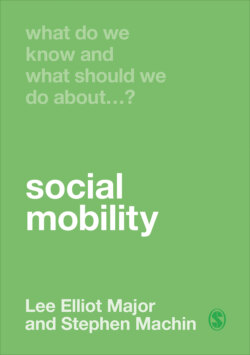Читать книгу What Do We Know and What Should We Do About Social Mobility? - Lee Elliot Major - Страница 18
На сайте Литреса книга снята с продажи.
The Era of Falling Absolute Mobility (2008–20)
ОглавлениеWhen he became Prime Minister in 2007, Gordon Brown set his sights on improving absolute mobility, likening it to a national crusade. However, the plan rested on improving people's wages. The global financial crisis of 2007–8 saw the UK's economic growth stalling. Workers went through the worst sustained period of real wage decline since Victorian times. The golden age of the 1950s and 1960s has turned into the bleak age of the early twenty-first century.
Falling absolute mobility at age 30 is shown in Figure 2.4. It charts the proportion of children who go on to earn more than (or as much as) their fathers did for successive generations. In the middle of the first decade of the 2000s, over half of 30 and 40 year olds exceeded or equalled their fathers’ earnings in real terms at the same ages (the peak was in 2006–7 at 64 per cent). But by 2019, this fell dramatically to 44 per cent. The majority now earned less. The dream of just doing better, let alone climbing the social ladder, had fallen. The reason for this is the slowdown in economic growth and extremely low real wage growth in the UK since the onset of the global financial crisis (Blanden, Machin and Rahman, 2020). The real wages of workers in sectors affected more by the huge exchange rate depreciation that accompanied the unexpected Brexit referendum result acted to further slow real wage growth, through the twin effects of slower wage growth in worse-hit sectors and higher price inflation (Costa, Dhingra and Machin, 2019).
Figure 2.4 Absolute intergenerational mobility, 1995 to 2019
Notes: Percentage of children whose real weekly earnings matches or exceeds that of the generation of their fathers when both are aged 25–44 (consumer price index used to deflate earnings), from the 1995 to 2019 Labour Force Surveys.
Source: Taken from Blanden, Machin and Rahman (2020)
In 2011, improving social mobility was announced as the ‘principal goal’ of the Coalition government's social policy (Cabinet Office, 2011). It oversaw real-terms cuts to school funding, but introduced a pupil premium grant to support disadvantaged pupils. At the same time it introduced a new levy to support apprenticeships to give a much needed boost to training in the workplace. David Cameron's advisers came up with a phrase for the Etonian Prime Minister to demonstrate his aspirations for a classless society: ‘It's where you are going to, not where you're from that counts.’ But the problem was that many people at the top of the social hierarchy wanted to stay put.
Economic and social fractures from the global financial crisis, austerity and Brexit exposed a disconnect between the Westminster elites and the communities they are meant to serve. The least socially mobile areas of the UK were those areas most likely to vote for Brexit. Those with little chance of moving up tended to vote to leave the European Union (Elliot Major and Machin, 2018).
In December 2019, Boris Johnson's return to power extended a remarkable Parliamentary tradition: every Prime Minister since the end of the Second World War who has attended an English university has attended just one institution: Oxford. Johnson was one of 11 Etonians in the new Parliament.
Social mobility remained a popular concept among the populace despite growing scepticism about the openness of the UK. The crushing defeat for the Labour Party, delivered by many working-class constituencies in the Midlands and the north of England, came after it vowed to focus on improving social justice rather than social mobility, helping the many not just the few.9 The voters disagreed: they wanted both.
Johnson proclaimed this new administration was the ‘people's government'. The Cabinet included a record number of ministers from ethnic minority backgrounds. Yet, in other respects, government ministers looked very familiar. Just under two-thirds (64 per cent) were privately educated. Like all the Prime Ministers before him, Johnson vowed ‘to level up opportunity around the country…closing the opportunity gap'.
In 2020, the coronavirus pandemic swept across the world, triggering a global recession. As with previous downturns, the most vulnerable workers, those on short-term contracts with low pay and minimal benefits, stood to suffer the most (Adams-Prassl et al., 2020). Yet the crisis also saw unprecedented moves from the government to support employees most at risk, amid growing recognition of the role played by key public sector workers. Many asked whether the collective response to the pandemic would usher in a new cohesive era for the country. Could it turn away from a reliance on global markets towards a more self-sufficient economy that would be more equitable for all its citizens? Or would the crisis undermine the Prime Minister's promise to invest in the disadvantaged areas which had swept him to power?
